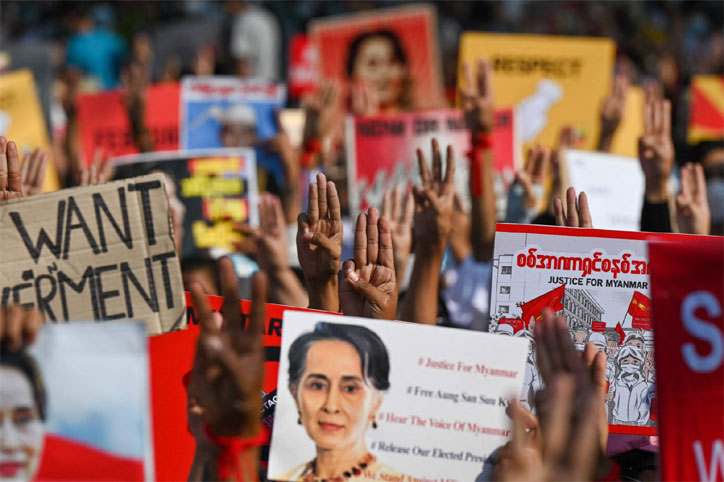By FnF Desk | PUBLISHED: 01, Mar 2021, 10:14 am IST | UPDATED: 01, Mar 2021, 11:58 am IST

What a difference three decades make. In 1988, when Aung San Suu Kyi confronted the generals of the country then known as Burma, she was a beacon of light, capturing the global imagination. She personified the human spirit taking on an army that rejected the reality that it had lost an election it had called. In disregard of the outcome, the military had jailed the elected parliamentarians and pretended nothing had happened.
Many prominent generals were comical. Superstitious followers of numerology, they arbitrarily changed rules overnight, such as the side of the road to drive on, and banned mobikes in the capital then known as Rangoon. But they were sinister, too—political prisoners were tortured and soldiers fought endless wars against many insurgencies across Burma.
The generals enriched themselves while the world honoured Aung San Suu Kyi, who was under house arrest. That changed in 2010, when she was released and her party, the National League for Democracy (NLD), fielded candidates in parliamentary by-elections in 2012. The NLD swept the polls, as it had in 1990. In 2015, it easily won parliamentary elections, and while the constitution forbade her from becoming president, parliament created a powerful post—state counselor—which effectively made her the nation’s leader. The NLD won the 2020 elections even more resoundingly: regardless of the state of the nation, with its insurgencies, concerns over corruption, restrictive laws, and the Rohingya crisis, her popularity remained undiminished.
Now history repeats itself, with troops on the streets once again and she under detention. Global support for her has been unsurprisingly muted. For a free Aung San Suu Kyi was different from the one who was under arrest. Not the author of two fine books about her country, not the woman with a flower placed strategically in her hair—who I remember at an event commemorating the international human rights day saying that democracy meant not only the freedom to speak, but also carried the obligation to listen to other points of view—but the one who would not condemn the army for its grave crimes against humanity in Rakhine state, who said “I don’t know" when asked if Rohingyas were citizens of her country, who ignored calls to release journalists Wa Lone and Kyaw Soe Oo from jail, and prosecution of poets Saw Wai and Maung Saunkha,whose parliamentarians approved laws that restricted freedoms, and who and squandered global goodwill by defending her army’s conduct against Rohingyas at the International Court of Justice (ICJ). She may not have ordered attacks on fleeing refugees, and may have had strategic reasons to work with the generals, but her silence, acquiescence and indeed her support made her complicit.
The generals could not have picked a better time to act. The world is distracted by the pandemic and no longer places Aung San Suu Kyi on a pedestal. After she defended the junta at the ICJ, the military doesn’t need her as a shield anymore. The size of her parliamentary majority threatened the military’s dominance. It also upset the retiring commander-in-chief Min Aung Hlaing’s best-laid plans to become the next president. So, the tanks went marching in.
To be sure, those who criticize Aung San Suu Kyi do not support the military. And those who condemn the coup are not fans of the NLD. A plague on both houses, Shakespeare had said. But there are fundamental questions.
Granted, the generals are wrong, but is it right to seek the restoration of a civilian government whose commitment to openness and human rights is questionable? Are democratically-elected governments immune from criticism? What if the elected party is majoritarian and its leaders undermine democratic norms and minority rights? Brazil, Turkey, Israel, Bangladesh, Hungary, Russia, India and the Philippines are some contemporary examples where the elected leaders are popular but democracy has declined. Many of these leaders seem to have convinced powerful majorities in their countries that they are somehow persecuted, even as minorities are often blamed for imagined existential crises.
In the 1990s, fearing a fundamentalist takeover, the Algerian military cancelled the second round of elections since the profoundly undemocratic Islamic Salvation Front was headed to victory after its impressive performance in the first. The international community protested. In the same vein, it must oppose what happened in Myanmar.
A flawed democrat is better than an apparently benevolent dictator, because a democrat can be removed by an election. A charismatic, demagogic leader is dangerous in a democracy, but a coup is not the solution. Challenging a demagogue’s divisive politics is hard work. It takes painstaking mobilization, sustained campaigns, attractive communication, and persistent commitment. Tolerance cannot triumph over obstinacy and bigotry by embracing intolerance, but by asserting the politics of hope. And hope should not be confused with naïve optimism. As Vaclav Havel put it, hope is not the conviction that something will turn out well, but the certainty that something makes sense, regardless of how it turns out.

by : Priti Prakash
The issue of deportation of Indian migrants staying illegally in the US took an emotionally charged ...